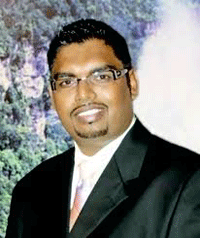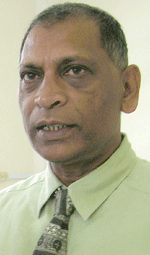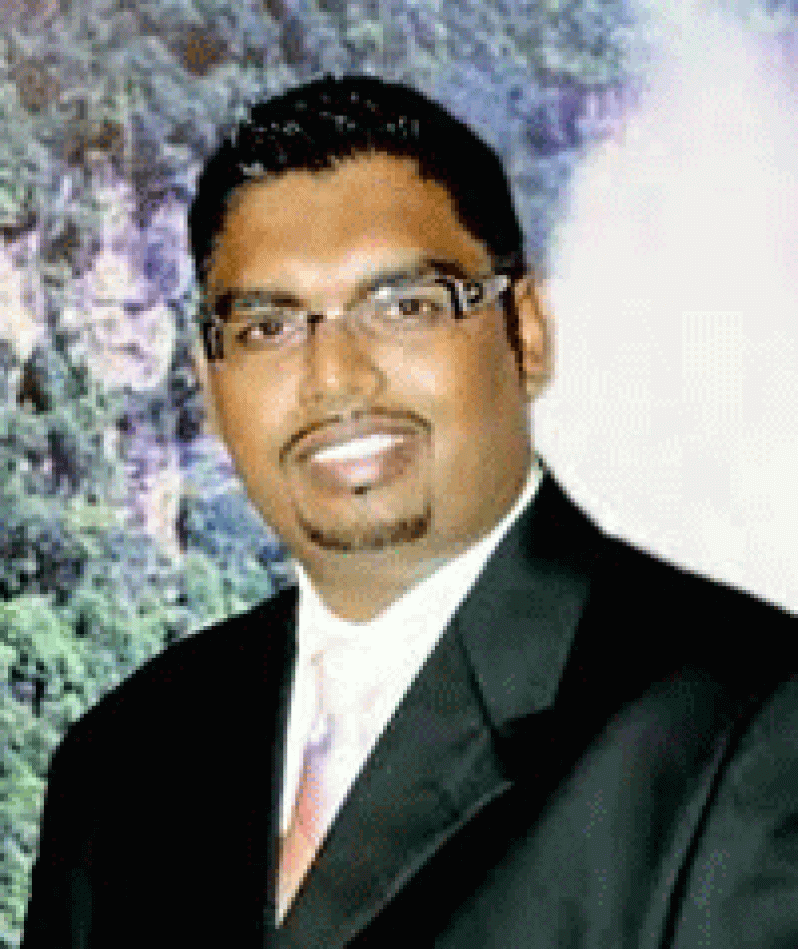Two Ministers join in underscoring resources management
GUYANA is playing a key and important role in safeguarding the global population, in the context of implementing economic development plans for the sustainable growth of the environment and natural resources, such as water.  Minister of Housing and Water, Mr. Irfaan Ali made this pronouncement at the start of the symposium to mark World Water Day, yesterday, at the Guyana Water Incorporated (GWI) complex, Vlissengen Road, Georgetown.
Minister of Housing and Water, Mr. Irfaan Ali made this pronouncement at the start of the symposium to mark World Water Day, yesterday, at the Guyana Water Incorporated (GWI) complex, Vlissengen Road, Georgetown.
The observance this year, under the theme ‘Water and Food Security’, was earmarked by the United Nations General Assembly as a means of focusing attention on the importance of freshwater and to advocate for the sustainable management of freshwater resources.
In his address, Minister Ali emphasised the importance of the involvement of young people in the process of water conservation and management through education.
“They will have the difficult task of living with the policy taken at global and national levels, so it is important they are involved in these debates at a very early stage, so that they will have a better understanding of the changes in human landscape today,” he said.
World Water Day 2012 in Guyana was observed with the forum which aims to educate high school students about the importance of freshwater resources to food security.
Ali called attention to several critical issues raised at a recent ministerial meeting in France, where a number of matters relating to water, including balance, climate change, policy reformation, incentives and subsidies, level of public/private partnership and technology transfer in managing water, were discussed among leaders and policy makers throughout the world.
CHALLENGES
In highlighting some of the challenges facing the world today, he said: “Though it takes more water to produce beef as against wheat, the reality is, that governments around the world are encouraging farmers to produce more, faced with the difficult responsibility of ensuring people have enough to eat and for the market. More importantly, they are faced with the challenges that arise from the expanding middle class and, as the economic scenario changes, people‘s eating habits change, the reality of the situation is that we will have to produce more meat because the demand is there. The economy is based on demand and supply.”
The Minister, in an effort to strike the crucial balance, pointed to a need for change in the way citizens view the resource, particularly in Guyana “where we are known as a country with a people who waste the resource.”
“This calls for encouraging the change and understanding that, whilst water is a basic human right, the extraction of that water for human consumption is very costly. In Guyana, we subsidise the delivery of water to the consumer by more than 70 percent. That may be a good thing in providing access to water but, on the other hand, it might encourage the wastage of water,” Ali posited.
To deal with this, he underscored the need to find the balance, which he said will require a change in culture to ensure that economic growth and agriculture expansion is met with a balance in terms of water use.
To this effect, he explained that 70 percent of blue water withdrawals globally go towards irrigation agriculture, 20 percent to total cultivated agriculture and contributes 40 percent of global food production and, by 2050, more water will to go towards irrigated agriculture in meeting the global demands for food, creating water stress.
DEMANDS
According to Minister Ali, the challenge will arise in finding a sustainable solution to meeting the demands for global food supply while promoting water resource management.
Alluding to the country’s efforts in this regard, he said: “This will require a lot of collaboration in finding a sustainable solution. Here, in Guyana, we have just completed the development of the IWRM. We will have the consultations soon and we are hoping to implement this as a policy measure and are happy to hear about the Belize and Grenada model as we will also have to develop capacity building and institutional strengthening, especially in hinterland communities.”
He noted, too, that achieving the right balance will require the re- examination of issues of pricing and subsidies, balance in food production and an examination of increasing costs of production, while adopting relevant cost effective technology.
Ali acknowledged that food production will increase in Guyana, which means increases in the demand for water, since the country has expressed the hope of regaining the status of the breadbasket of the Caribbean.
He maintained that the policy direction of the government is to go towards increased food production for the domestic, regional and international markets, which carries with it water implications.
Dealing with these implications will require re-examination of education programmes in schools, the access and sustainability of water, policy interventions and, more importantly, the impact on the Low Carbon Development Strategy (LCDS) which speaks to the development of Guyana in a sustainable way.
Minister Ali also recognised the relevance of the World Water Day observance in raising awareness to the issue that affects all levels of human existence.
PROGRESS
In his address at the same forum, Agriculture Minister Leslie Ramsammy said there has been significant progress in global water management over the last 20 years.
As to the link between water and food, he explained: “More than 75 percent water consumed per day comes from food and not from the taps. As we think of food production, the most intensive use of water is for agricultural purposes, more than 70 percent of world supply is consumed directly for this purpose, more than for drinking and industrial development.”
Dr. Ramsammy said the challenge facing many countries like Guyana is managing the available water supply in an inexpensive way, in the wake of climate change, while ensuring that food is produced at the lowest possible price.
“This is the struggle for countries like Guyana. These are the challenges, the intense use of water in agriculture. We have a better chance of managing water. We also have a real opportunity to feed not only our people but to contribute to feeding the seven billion in the world who are likely to grow to nine billion by the year 2050,” the Agriculture Minister stated.
He insisted that Guyana has done a remarkable job in managing water supply and pointed out that the event is a good opportunity, during Cheddi Jagan Month, to look to the improvements in irrigation across the country as modern day improvements are bent towards making Guyana a food secure country.
“This is our commitment to maintain, improve and continue to build the sector. Agriculture can propel us in that direction and we need to ensure that we secure our water supply and become an agriculture sector that wastes little water,” he advised.
During the programme, representatives of the Pan American Health Organisation (PAHO) and the Food and Agriculture Organisation of the United Nations also made presentations on the inextricable link between water and food security.


.jpg)











